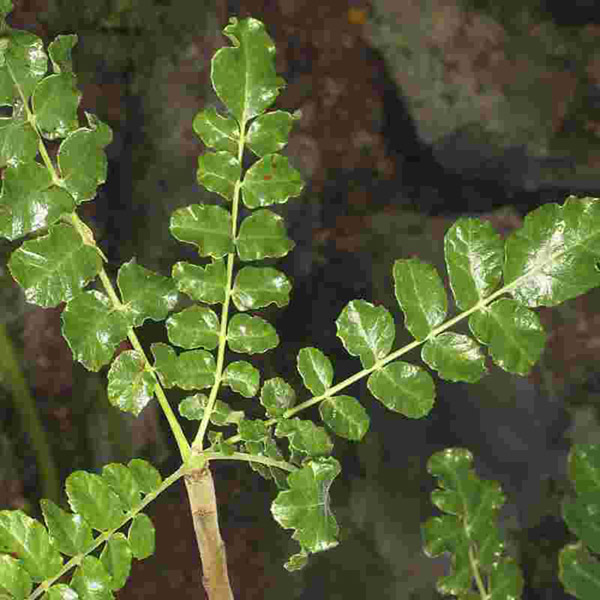Botanical name
Boswellia serrata Roxb.
Family
Burseraceae
Common name
Indian frankincense, Indian olibanum-tree, Boswellia
Information about the plant
When burned, resins and balsams release intense, fragrant scents used in ritual ceremonies. The most commonly used frankincense in Catholic churches is a resin obtained from Boswellia carteri Birdw. (synonym of Boswellia sacra Flück.), a wild tree grown in Somalia, Ethiopia, and South Arabia. Incisions are made in the bark, out of which a resin is collected. The resin hardens quickly upon exposure to air, which is then easily removed and sold as incense (olibanum) in granular form.
The Indian frankincense is of medicinal interest, obtained from the Boswellia tree (B. serrata), a large tree that grows in the dry, mountainous regions of India. Its crown is spread out flat, with 9 to 14 pairs of pinnate leaves, the pinnae have crenate-serrate to almost entire margins. The greenish ash-colored bark peels off in papery, smooth pieces.
The gum resin from the Boswellia tree hardens into lumps of various shapes. These lumps are yellowish to brownish in color, irregularly spherical or resembling stalactites, and light gray with a dusting. They are also easy to break, with a conchoidal, waxy fractured surface. Indian frankincense is collected twice a year (in March and June), with cuts made in the trees months beforehand. Each tree yields about 1kg of gum resin per year.
Medicinally used parts of plants (herbal drug)
The air-dried gum resin (Indian frankincense - Olibanum indicum), collected from the trunk and branches, is separated and used.
Constituents of the herbal drug
Indian frankincense contains about 60% resin, including various boswellic acids (pentacyclic triterpenic acids), as well as polysaccharides (gums) and essential oils.
Quality of the drug
The quality of Indian frankincense (Olibanum indicum) is specified in the European Pharmacopoeia (Ph. Eur.).
Medical applications
Recognised medical use
Indian frankincense has not been reviewed by the HMPC.
ESCOP: For painful joint arthritis and the symptomatic treatment of inflammatory bowel diseases.
In Ayurvedic medicine, Indian frankincense is used for the supportive treatment of chronic polyarthritis and for remission treatment in inflammatory bowel diseases, including ulcerative colitis and Crohn's disease. Clinical studies support the effectiveness of Indian frankincense in treating inflammatory bowel diseases, but the final evaluation of the indication and therefore, the authorization in Germany is still pending. Standardized preparations approved abroad can be imported and used on individual prescriptions.
Traditional use
Indian frankincense has not been classified as a traditional herbal medicinal product (Article 16a of Directive 2001/83/EC). Not listed as a traditional medicinal product.
Herbal drug preparations in finished dosage forms
- Dry extract of Indian frankincense in tablets
Dosage
Finished medicinal product: See patient information leaflet.
Indian frankincense cannot be taken as a tea. If necessary, the drug can be sucked for inflammation of the oral mucosa.
Preparation of a tea
Not applicable.
Notes
No safety studies are available on the use of Indian frankincense during pregnancy and lactation. The use in children and adolescents under the age of 18 is not recommended due to a lack of evidence.
Side effects
Rarely, gastrointestinal complaints; sometimes, allergic reactions.
Interactions
None known.
References
Herbal drug monographs
Further literature
Commentary on the European Pharmacopoeia (Indian frankincense, No. 2310)


